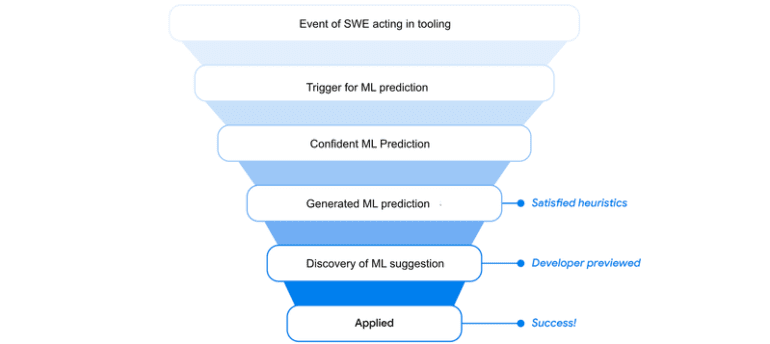- Google highlights the evolution of AI in software engineering from 2019 to 2024.
- Prioritizes AI projects based on technical feasibility and impact on engineers’ workflows.
- Focuses on quick iterations and continuous learning to improve UX and model quality.
- Monitors productivity and satisfaction metrics to gauge the effectiveness of AI-powered tools.
- Applications of LLMs in software development include inline code completion and resolving code review comments.
- Key takeaways include the importance of seamless integration, balancing review and value, and iterative improvement.
- Google is doubling down on leveraging the latest foundation models infused with developer data for future AI applications in software engineering.
Main AI News:
In a whirlwind of technological advancement, the landscape of software engineering has been dramatically altered by the integration of artificial intelligence (AI). Back in 2019, the concept of AI aiding in code creation seemed like a distant dream to many software engineers. Fast forward to 2024, and the narrative has shifted significantly, with AI playing an integral role in shaping the way code is written and developed.
Google, a pioneer in technological innovation, has been at the forefront of this revolution. In a recent press release, Google sheds light on its journey of integrating AI into software engineering processes and offers insights into the path ahead.
The Evolution of AI in Software Engineering
In 2024, there’s an air of excitement among software engineers as they embrace the potential of AI in their craft. From ML-based autocomplete tools to AI-powered code completion, the impact of AI on software development workflows is palpable. Google’s internal code completion tool, along with commercially available products, has become indispensable for many engineers, streamlining their coding experience and enhancing productivity.
Google’s Approach to AI Integration
Google’s approach to incorporating AI into software engineering tools is guided by three principles:
- Prioritize Impact: Google focuses on ideas that promise both technical feasibility and significant impact on engineers’ workflows. By prioritizing projects with measurable outcomes, Google ensures that its AI initiatives deliver tangible benefits to developers.
- Iterative Learning: The key to success lies in rapid iteration and continuous learning. Google emphasizes the importance of refining user experience (UX) and improving model quality through quick iterations. By gathering feedback and monitoring user behavior, Google fine-tunes its AI algorithms to better serve the needs of developers.
- Measure Effectiveness: Google closely monitors productivity and satisfaction metrics to gauge the effectiveness of its AI-powered tools. By tracking metrics such as code completion rates and user satisfaction levels, Google ensures that its AI initiatives are delivering value to developers.
Applications of LLMs in Software Development
With the rise of transformer architectures, Google has explored various applications of large language models (LLMs) in software development. Inline code completion stands out as one of the most popular and impactful applications of LLM technology. By leveraging the code itself as training data, Google’s AI-powered autocomplete tools seamlessly integrate into developers’ workflows, enhancing efficiency and reducing manual effort.
Key Takeaways and Future Outlook
Through its journey of integrating AI into software engineering processes, Google has gleaned valuable insights:
- Seamless Integration is Key: AI features that seamlessly blend into developers’ workflows yield the highest impact. By presenting suggestions that align with users’ natural workflow, Google ensures widespread adoption of its AI-powered tools.
- Balancing Review and Value: As AI increasingly assists developers in code creation, striking a balance between the cost of review and added value is crucial. Google addresses this challenge by setting acceptance rate targets, ensuring that AI suggestions enhance productivity without compromising code quality.
- Iterative Improvement: Quick iterations and online experiments are essential for refining AI algorithms and improving user experience. By leveraging user feedback and usage data, Google continuously enhances its AI-powered tools to meet the evolving needs of developers.
Looking ahead, Google is doubling down on its efforts to harness the latest foundation models infused with developer data. The next wave of AI applications in software engineering is expected to encompass a broader range of activities, including testing, code understanding, and maintenance. By embracing natural language interfaces and automation of larger-scale tasks, Google aims to further revolutionize software engineering processes and drive innovation across the industry.
Call to Action
Google encourages collaboration within the software engineering community to establish common benchmarks for evaluating AI-powered tools. By collectively shaping benchmarks that span a wider range of software engineering tasks, practitioners and researchers can propel the field towards practical engineering solutions and foster innovation on a global scale.
Conclusion:
The integration of AI into software engineering processes, as demonstrated by Google’s advancements, signifies a significant shift in the market. As AI-powered tools become more prevalent and sophisticated, companies will need to adapt by embracing AI-driven solutions to remain competitive and meet the evolving needs of developers. This trend underscores the importance of investing in AI capabilities and fostering collaboration within the software engineering community to drive innovation and propel the industry forward.

